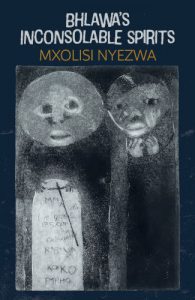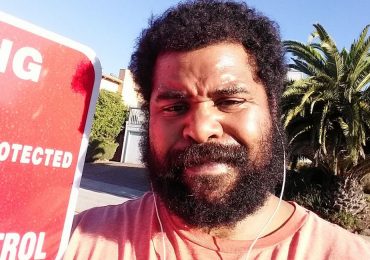The JRB presents an excerpt from Mxolisi Nyezwa’s new collection of poetry, Bhlawa’s Inconsolable Spirits.

Mxolisi Nyezwa
Bhlawa’s Inconsolable Spirits
Deep South, 2023
^^^^^^^
Everywhere I went demons and singing spirits followed
me, even through crowds of onlookers, or when walking
past old men standing by their front gates looking at the
defiant world. These beings followed me through sleep
and waking like obstinate beggars. I never had a chance
to own anything, not a horse nor a blundering soul. I
wrote everything on the wall in the spindly shapes of
mathematics. To ensure that my teachers never abused
my performance of numbers and visible orbits of stars, I
showed them the numbers that I had programmed in my
soul. Trees, animals, songs, seamen’s tales were my friends
and enemies. They gave me tortuous times. They were like
long prisons, sad butterflies, black spades. I ended each
day by walking to the ocean to look for the mermaids and
the drinking seafarers.
One night a procession of thieves and mongrels commenced
walking from the Holy Virgin Mary, right up Church
Street towards the mayor’s office in dead town. Slithering
snakes and green reptiles took over the building. Inside
the chamber guileless councillors were sweating under
a table, counting their steps to a gully in the middle of
a street where their souls were going to be laid to rest.
The rest of the community folded their tents and left. The
township grew into an oven burning with human skulls.
The voices of two children mimicked the wily roads and
prayed religiously to the charcoal face of God.
I knew that beyond that darkness and smog there was earth,
light and freedom. There were people like me who thought
and felt like I did. The earth, though I could not see it from
my room in Madala, was round like a rolling ball. The moon
was white like the sea. Nothing was invisible except water,
earth, wind and fire, those four elements. God was the fifth
element. He watched us and said nothing.
^^^^^^^
I went down the corner street to the same house where I
think I was conceived, when my spirit body changed to the
body of a human. I was convinced I would meet Philile the
blacksmith there. I had a black stone in my hand. In the
house lay the silent body of death. I had a premonition of
a horrible death with a bullet lodged in my spinal column,
and being reduced to a bed at home for the rest of my
life. I wanted to be closer to death quickly so that my
punishment, when it happened, wouldn’t be too heavy to
bear in my soul.
It always seemed to me that people transmitted their fears
in the clothes they wore, the black or brown shoes on their
feet, the red and blue blazers that covered their bodies.
The stranger that I met in the house walked around with
a strange silence, wearing a green hat, always smiling. He
called out, now and again, in a hoarse voice, ‘Here, here’,
pointing to a row of lighted steps running to a side room,
his eyebrows raised. His red lips were rapidly becoming
dry because of his haste to speak everything at once, and
he softly drawled again in a hoarse voice, ‘Can you see
what is happening here, and what is written up there? Is it
an A or a B?’
Soon after my arrival a dog greeted me on the doorway,
a fierce creature with one tiny eye. It leapt forward and
started to quarrel with my shoes, growling and roaring
like all dogs do to impress their owners. The man struck
himself once, then twice, against the shin with the blunt
end of a knife. His wife, who was sitting close to the stove
warming herself, interfered immediately, ‘I told you, you
must learn!’
After this, everything went quiet throughout the house: the
chattering of the mice in the sideboard, the wobbling of
a metallic knob on the stove, the dying years which had
come down to settle comfortably inside the vestibules of
the kitchen sink and the washing machine. They all stood
defiantly in the middle of a tiny passage leading to the
bedroom, bowing down heavily to the ground, forgiving
the man and his innocent wife their obstinacy. The man
softly crossed himself, hanging his shameful head closer
to the floor. He banged something that was hidden in his
left hand against the side table. He tasted the bloody fruit
on the raised wooden table in the kitchen. The sun began
to set on his face. Everything began to happen so quickly.
‘Tell me about yourself young man,’ said the man. ‘You’re
such a delicate boy,’ the wife added slowly. ‘You must
have run very fast to get here.’ For a moment nothing was
spoken by the strange couple. From outside the windows
of the house I could see the township was readying itself
to sleep.
^^^^^^^
My father worked hard in his life of 68 years, smoking his
Van Ryn’s cigarettes, looking after my mother, myself and
my three brothers. We always had books at home which
my mother bought through Reader’s Digest. But it took me
quite a long time to realize the magnificent power of written
words, especially poetry. To respect and adore words for
the heroic beings and angels they are, often frequenting
our despairing souls with the softness of their breath.
I always look at the world through my window in the
township. Little has changed. The houses built by the
municipality in a street near the beer hall are falling down.
The law in the township jungle is greedy and violent.
Everything I see I condemn. I judge harshly. I compare the
world to my simple spot in this harbour. The shadow that
hangs low over the docking ships and the dismal harbour,
looks bloodless and cold like the fingers of the dead. I notice
that the housefly only circles the food that I put on the table
in front of me. It wants to partake of my meal, dine or die
with me. It ignores the custard that has dripped down from
my plate to smear the floor with its bright yellow colour.
Almost every morning I go barefoot to the sea to look for
poems. The sea is very close to where I live. I sometimes
hear it laughing or shouting in the night. It seeps and
dances along the shore for many miles. The mysterious
water is blue or dark green and never fades from the
looker’s eyes. My body is the warm sternum of a flying fish,
the busy wing of some faraway eagle. My torso and my
limbs are enmeshed in a dark pact. My body exists as a coy
ally, a friendly organism of feelings and actions. An insect,
a bedbug, eats slowly at my flesh. I stand up to remove
the shirt that hides the intruder. The insect goes and sits
elsewhere. An alliance must begin for the entire world to
serve my flesh and the inscrutable bug.
~~~
- Mxolisi Nyezwa was born in 1967 in Bhlawa (New Brighton). He is the author of three books of poems in English, Song Trials (2000), New Country (2008 ) and Malikhanye (2011), and a book of Xhosa poems, Ndiyoyika (2016). His poetry has appeared in many anthologies in South Africa and internationally. In 1997 Nyezwa founded the multilingual cultural journal Kotaz, which he still edits. He is also a publisher of books in Xhosa under the imprint Imbizo Arts. He runs a small business and urban chicken farm in Motherwell, outside Gqeberha.
~~~
Publisher information
Bhlawa’s Inconsolable Spirits is startling, often humorous, always graphic. Determined to understand everything, the young Mxolisi Nyezwa turns to writing to ‘train himself to see’. In Nyezwa’s vision no boundaries exist between imagination, day-to-day survival, spiritual reality, and economic violence: ‘What everyone saw up there at night in Bhlawa, and called the moon, was just the hungry face of God.’





